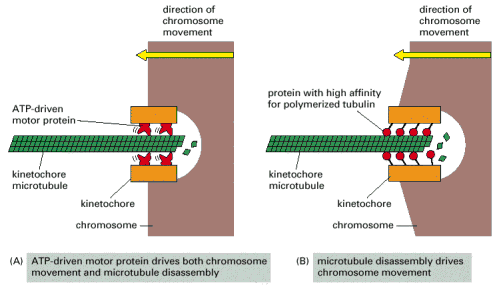Biology Forum › Cell Biology › what is depolymerisation
- AuthorPosts
- July 23, 2006 at 1:45 pm #5303
 IsabellaParticipant
IsabellaParticipanthi guys 😛
Can someone tell me what the Depolymerisation of the micritubules is? And what effect it may have on the dna-content of a cell?
I’m searching in the internet all day long for an appropriate explanation, but failed in finding something!
It would be really nice of you if you help me a little bit 8) - July 23, 2006 at 3:45 pm #52043
 NavinParticipant
NavinParticipantI think depolymerisation is the removal of the monomers, in this case the removal of the monomers of microtubules. If I am not mistaken, some people believe that during anaphase of the cell cycle, the kinetochore of the chromosome depolymerises the microtubules so as to move to opposite ends of the cell.
- July 23, 2006 at 3:47 pm #52044
 MrMisteryParticipant
MrMisteryParticipantAre you referring to the desorganising of the mitotic spindle? That’s made out of microtubules…
Another thing might be dinamic instability, but that has no effect on DNA…
- July 24, 2006 at 4:09 am #52065
 LilKimParticipant
LilKimParticipantthe microtubules connect to the kinetiochores of chromosomes. And, after all of the chromosomes have aligned at the metaphase plate a series of events (separation of sister chromatids by sepharase as well as a kinase/phosphatase cascade) leads to the separation of the sister chromatids.
chromatid movement away form the metaphase plate is mediated by the microtubles that form the spindle. MT’s in the overlap (not touching chromtids) use molecular motors to legnthen the spindle (therby distancing the 2 daughters cells and chromosomes). And, the MT + end (touching the kinecthore) depolymerizes rapidly. However the chromatid remains captured onto the end of the depolymerizing MT… as it travels to the daughter cell.
Hope this helps… if you need further clarification or references please ask!
– KIM - July 24, 2006 at 11:17 am #52072
 NavinParticipant
NavinParticipantI’ve found some information for you:
Credit given to:
Bruce alberts, Alexander Johnson, Julian Lewis, Martin Raff, Keith Roberts and Peter Walter (2002). Molecular Biology of The Cell (4th ed.) Garland Publishing. (http://www.ncbi.nlm.nih.gov)
and
Soper, pg 782Figure 18-27. Two alternative models of how the kinetochore may generate a poleward force on its chromosome during anaphase A. (A) Microtubule motor proteins at the kinetochore use the energy of ATP hydrolysis to pull the chromosome along its bound microtubules. Depolymerization of the kinetochore microtubules follows as a consequence. (B) Chromosome movement is driven by kinetochore microtubule disassembly: as tubulin subunits dissociate, the kinetochore is obliged to slide poleward to maintain its binding to the walls of the microtubule. As motor proteins are required for anaphase A, in this model, they would be required mainly for the microtubules to remain attached to the kinetochore.
- July 24, 2006 at 8:12 pm #52097
 sdekivitParticipant
sdekivitParticipantchapter 16 in Molecular Biology of the Cell by Alberts et al is about the cytoskeleton.
Polymerization and depolimerization had to do with the hydrolysis of GTP in the GTP-cap. GTP = polymerization of tubulin and GDP = depolimerization.
- AuthorPosts
You must be logged in to reply to this topic.
No related posts.
